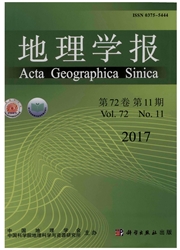

 中文摘要:
中文摘要:
利用豫西伏牛山的两组油松树轮宽度年表.重建了该区域1874年以来5—7月的平均最高温度。并用Jackknife和Bootstrap等方法进行了方程稳定性检验.统计检验参数表明重建序列与实测序列吻合较好,且方程稳定可信,重建方程的解释方差为40%(调整自由度后为39%)。重建显示.在过去134年中.豫西伏牛山区5—7月平均最高气温经历了4次冷期和5次暖期。其中,20世纪20—30年代末是最显著的暖期,之后开始降温,至50年代降到谷底,温度小幅回升后.在70-80年代中期又显著下降.80年代末以后开始增温。该重建温度序列与秦岭中部南五台地区温度序列有较好的一致性。
 英文摘要:
英文摘要:
Tree-ring width chronology was constructed by using the tree ring cores of Pinus tabulaeformis Carr. from two sites on Funiu Mountain in western Henan Province. Correlation analysis showed that the tree ring index was closely related to average maximum temperature of May-July. We reconstructed the average maximum temperature of May-July for Funiu region from 1874 to 2007. "Jackknife" and "Bootstrap" methods were used respectively to estimate reliability of regression function based on statistics between the observed and reconstructed series. The explained variance reaches 40% (39% after adjusted degree of freedom). The overall test results sufficiently supported the validity of our regression model. Reconstruction indicated that there were 4 cold and 5 warm periods for the past 134 years respectively in this area. The most significant warm period during the entire reconstruction occurred between the 1920s and 1940s, and then the temperature began to decrease and reached to the lowest point in the 1950s. After a slight rise, it decreased again during the 1970s and 1980s. The temperature has increased rapidly since the late 1980s, showing a warming trend. Both the Funiu and Nanwutai temperature curves can be well compared after 10-year moving average, and they showed the regional trends synchronously.
 同期刊论文项目
同期刊论文项目
 同项目期刊论文
同项目期刊论文
 Amplitudes, rates, periodicities and causes of temperature variations in the past 2485 years and fut
Amplitudes, rates, periodicities and causes of temperature variations in the past 2485 years and fut Summer mean temperature variation from 1710-2005 inferred from tree-ring data of the Baimang Snow Mo
Summer mean temperature variation from 1710-2005 inferred from tree-ring data of the Baimang Snow Mo Annual precipitation in Liancheng, China, since 1777AD derived from tree rings of Chinese pine (Pinu
Annual precipitation in Liancheng, China, since 1777AD derived from tree rings of Chinese pine (Pinu Temperature variations recorded in Pinus tabulaeformis tree rings from the southern and northern slo
Temperature variations recorded in Pinus tabulaeformis tree rings from the southern and northern slo Precipitation reconstruction from Hailar pine (Pinus sylvestris var. mongolica) tree rings in the Ha
Precipitation reconstruction from Hailar pine (Pinus sylvestris var. mongolica) tree rings in the Ha Annual temperatures during the last 2485 years in the Eastern Tibetan Plateau inferred from tree rin
Annual temperatures during the last 2485 years in the Eastern Tibetan Plateau inferred from tree rin Tree-ring precipitation reconstruction in the Chifeng-Weichang region, China , and East Asian summer
Tree-ring precipitation reconstruction in the Chifeng-Weichang region, China , and East Asian summer 期刊信息
期刊信息
